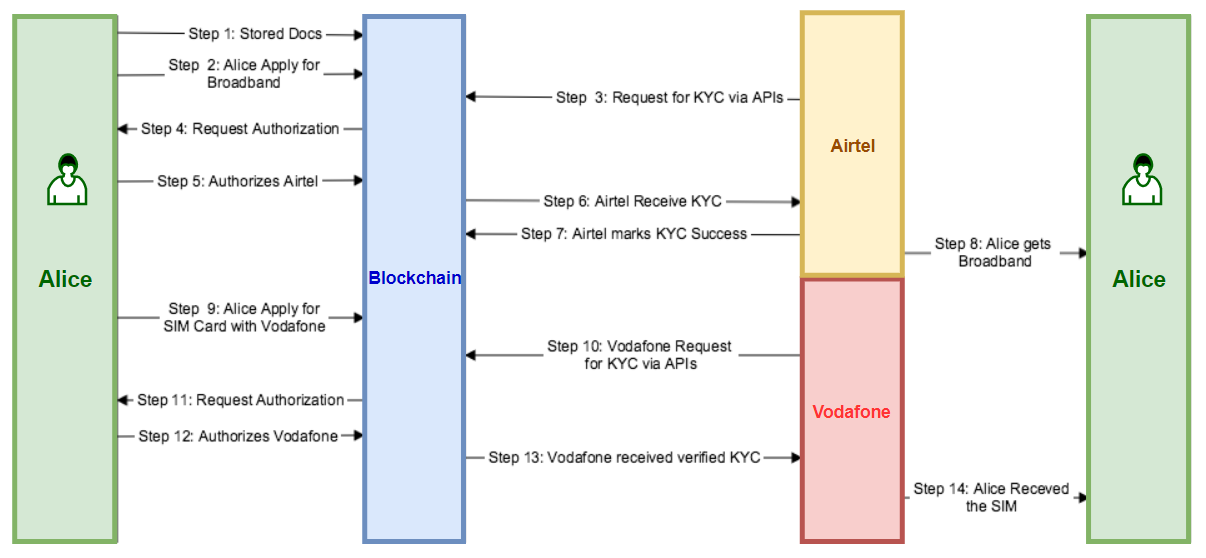What is the definition of KYC and how Blockchain can utilize this in banking sector?
If we are going to look at Wikipedia, Know your customer (KYC) is the process of a business, identifying and verifying the identity of its clients. The term is also used to refer to the bank regulation which governs these activities.
Blockchain can be used to do the KYC with just a few clicks.In banking system based on Blockchain, users has to store their documents once immutably & those incorruptible & undeletable documents can be used to get the KYC done as many time as the user wants once they KYC is done with at least one service provider.
Below is the flow which explains how this can be utilized.

In this case, If the blockchain user Alice wants to use the blockchain to maintain the documents & want to share it with Airtel while applying for broadband for the KYC purpose. Below will be the flow:
Step 1: Store Docs [One time only] Alice will signup & upload their govt., financial & personal records into the blockchain. Each document will be given a unique ID & will be stored in a Private Blockchain in split & encrypted manner.
Step 2: Alice wants to apply for Airtel Broadband online.
Step 3: Request for KYC via API. Blockchain API’s will be open for Airtel to use them for getting access & doing KYC. Airtel will optionally show a button or QR code in their online or offline application form saying [Do KYC with the blockchain].
Step 4: Blockchain requests to Alice for Authorization to Airtel.
Step 5: Alice Authorizes Airtel. Alice Click on the button, It will open a new pop-up/tab/window on web or app asking Alice to grant access to certain documents to Airtel. Alice authorizes Airtel for KYC (Like we do while signing up for Google, FB, Twitter etc.)
Step 6: Access the documents will be given to the Airtel & this sharing of the documents will be recorded as the transaction in the blockchain. Anyone can verify this “access grant” transaction among Alice & Airtel. Just like Bitcoin transaction, where you can see from which wallet to which wallet bitcoin has been transferred but you can’t see who owns that wallet. Until that wallet owner claims that wallet.
Step 7: Airtel performs the KYC & marks the documents about the status of KYC.
Step 8: Airtel issues the broadband line to Alice.
Step 9: Next time now Alice wants to get the Vodafone SIM card.
Step 10: Vodafone will use the same APIs and request for permissions to access KYC docs from Alice.
Step 11: Blockchain requests to Alice to authorize Vodafone to access the KYC docs.
Step 12: Alice gives access to the documents to Vodafone.
Step 13: Vodafone sees the “KYC-Done-Via-Airtel” flag in docs & then skips the KYC as it is already done by Airtel for the same documents & same user “Alice” saving tons of time and money (when doing the same for 100,000 users) while reducing turnaround time.
Step 14: Alice receives the SIM card.
Alice has to just click authorize button reducing her headache for KYC and Telecom companies saved the resources during the KYC.
I have that can be useful in understanding how Blockchain can be used in the KYC business.
From my experience, Multichain will be the best blockchain platform can be used to achieve this goal.
Thanks for reading
Congratulations @memo76! You received a personal award!
You can view your badges on your Steem Board and compare to others on the Steem Ranking
Do not miss the last post from @steemitboard:
Vote for @Steemitboard as a witness to get one more award and increased upvotes!
Congratulations @memo76! You received a personal award!
You can view your badges on your Steem Board and compare to others on the Steem Ranking
Do not miss the last post from @steemitboard:
Vote for @Steemitboard as a witness to get one more award and increased upvotes!